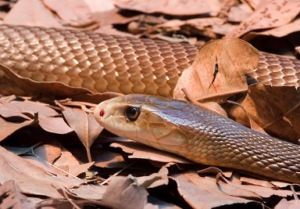News
Science and Nature News in Brief: Snakes alive! Police swoop nets nest of vipers
This article is more than 6 years old.
In other stories, Aarhus launches a satellite, a whole grain diet can help prevent diabetes, and Copenhagen Zoo ups the ante on the food front

It looks innocuous enough, but you don’t want to mess with one of these (photo: John/Flickr)
In a co-ordinated action and acting on information gleaned from social media such as Facebook, Copenhagen’s Vestegns Police raided several locations in Zealand yesterday and impounded 45 venomous snakes.
Amongst them were taipans, Gaboon vipers and rattlesnakes – all of which are illegal to keep as pets in Denmark, reports DR Nyheder.
Handle with care
During the raids that took place in Rødovre, Rødby, Nakskov and Roskilde, the police were accompanied by vets and snake experts. The snakes have been taken to a terrarium until a decision is made as to their ultimate fate.
Four men have been charged with breaking the animal welfare laws – an offence that typically results in a fine.
Aarhus University joins space race
At 13:00 on Thursday 31 January this year Aarhus University officially became a member of the elite group of universities worldwide that has a satellite in space. The Delphini-1, which was launched from the ISS international space station, is now orbiting Earth at a height of around 400 km, meaning that it is normally below the horizon when seen from Denmark. This only gives the students around 10 minutes four times a day to contact the satellite. Delphini-1 is a pilot project to gain experience through the construction, operations and communications. The satellite it is expected to remain in orbit for around a year.
Whole grain diet helps prevent diabetes
A major research project carried out by the Center for Gut, Grain and Greens (3G), which is headed by Professor Tine Rask Licht from DTU, has been able to document that eating whole grain helps to keep diabetes type 2 and cardiovascular disease at bay. Over six years 3G has studied the effects of increasing the amount of whole wheat, as well as reducing the intake of food containing gluten, on health and intestinal bacteria. “Our studies thus help underpin the scientific basis for dietary advice on choosing whole wheat variants for your health when you eat bread, pasta and other corn products,” said Licht. As a bonus, the change in diet can also result in some weight loss and people not feeling as bloated.
Copenhagen Zoo goes gourmet
Up until now, most people would not think of Copenhagen Zoo as a haven of fine dining. But this may change. A new investment of 5.5 million kroner in restaurants, cafes and conference facilities should result in visitors being offered more exotic fare when it comes to eating. Among other things an Asiatic-French bistro is planned that will offer direct views of the new panda enclosure as soon as it is finished. “We began implementing our new strategy plan last year, which food and drink is a big part of, because whatever time of year you come, we want our visitors to eat well,” said Christian Higraff, the zoo’s commercial director.
Something nasty in the water
As a result of last autumn’s recommendations from the Miljøstyrelsen environmental agency to test the water table across Denmark, 142 borings were taken at various sites. In the course of this, 31 places were found to have dimethyl sulfide (DMS) residue, reports BT. In five places, the amounts exceeded the acceptable limits. DMS is suspected of being carcinogenic and is thought to be a by-product of the breakdown of tolylfluanid, an organic chemical compound used as an active ingredient in fungicides and wood preservatives, which has been banned in the EU since 2010.










































